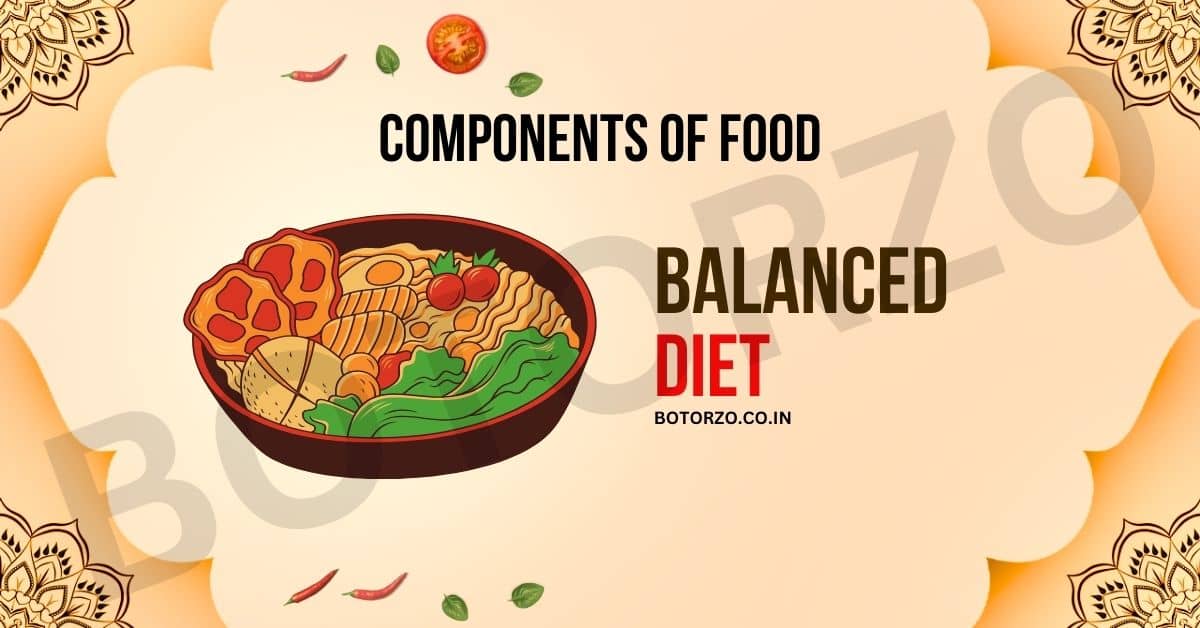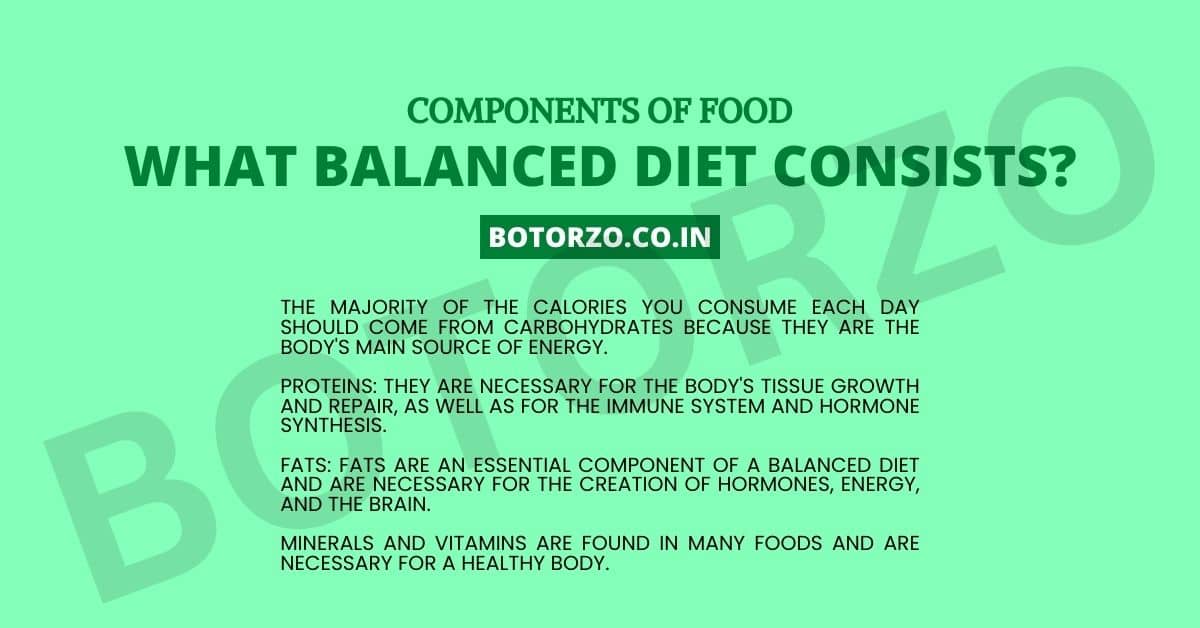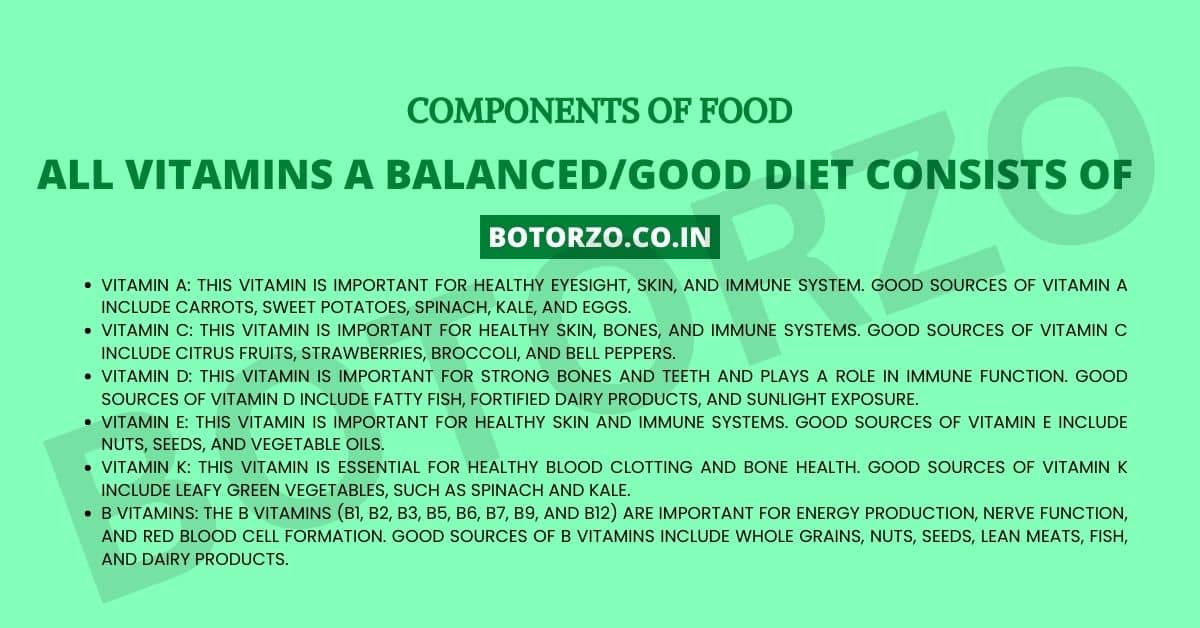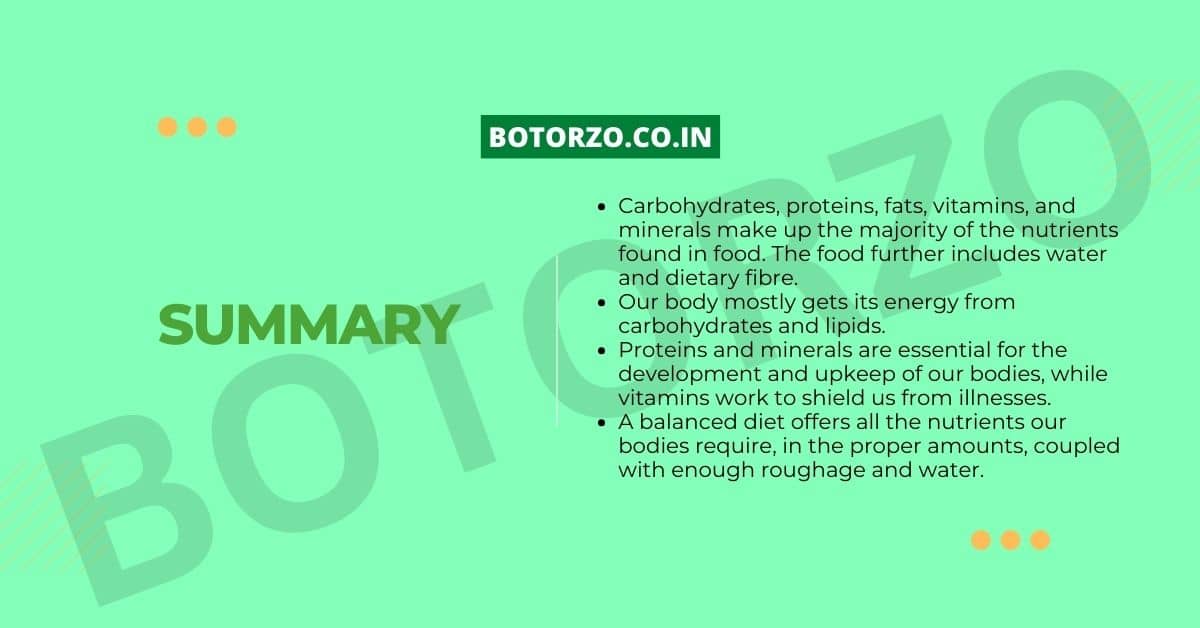
Our diet consists of the meals we typically consume each day. Our balanced diet should contain all the nutrients necessary for developing and preserving good health—the correct amounts of the nutrients that our body needs. Neither too much nor too little of either should be present. Water and roughage should both be present in sufficient quantities in the diet.
What is a Balanced Diet?
A balanced diet is a manner of eating that consists of various foods from various food categories in the appropriate amounts to provide your body with the nutrients it needs to function effectively.
What Balanced Diet Consists?

A balanced diet needs to include a variety of:
The majority of the calories you consume each day should come from carbohydrates because they are the body’s main source of energy.
Proteins: They are necessary for the body’s tissue growth and repair, as well as for the immune system and hormone synthesis.
Fats: Fats are an essential component of a balanced diet and are necessary for the creation of hormones, energy, and the brain.
Minerals and vitamins are found in many foods and are necessary for a healthy body.
Read the Components of food in detail.
A variety of foods from each food category should be included in a balance diet, and processed and high-fat meals should be avoided. Also, it’s crucial to watch your portion sizes and lower your intake of sweetened beverages and snacks. A balanced diet can help you feel better overall and lower your chances of developing chronic illnesses like obesity, diabetes, and heart disease.
all vitamins a balanced/Good diet consists of

A varied diet that supplies all the key vitamins required for optimal health should be part of a balanced diet. The following vitamins are necessary for a diet that is balanced:
- Vitamin A: This vitamin is important for healthy eyesight, skin, and immune system. Good sources of vitamin A include carrots, sweet potatoes, spinach, kale, and eggs.
- Vitamin C: This vitamin is important for healthy skin, bones, and immune systems. Good sources of vitamin C include citrus fruits, strawberries, broccoli, and bell peppers.
- Vitamin D: This vitamin is important for strong bones and teeth and plays a role in immune function. Good sources of vitamin D include fatty fish, fortified dairy products, and sunlight exposure.
- Vitamin E: This vitamin is important for healthy skin and immune systems. Good sources of vitamin E include nuts, seeds, and vegetable oils.
- Vitamin K: This vitamin is essential for healthy blood clotting and bone health. Good sources of vitamin K include leafy green vegetables, such as spinach and kale.
- B vitamins: The B vitamins (B1, B2, B3, B5, B6, B7, B9, and B12) are important for energy production, nerve function, and red blood cell formation. Good sources of B vitamins include whole grains, nuts, seeds, lean meats, fish, and dairy products.
Things To Know About a Balanced Diet
Many nutrients may be found in foods like bananas, spinach, sattu, jaggery, groundnuts, soybeans, sprouted seeds (moong and Bengal gramme), fermented meals (South Indian cuisines like idlis), a mixture of flours (missi roti, thepla formed from cereals and pulses), and other similar foods. As a result, one may have a healthy diet without spending a lot on food.
Eating the correct foods is not enough. It should also be cooked thoroughly to avoid losing nutrients.
Are you aware that some nutrients are lost during the cooking and preparation process?
After chopping or peeling the fruits and vegetables, washing them may cause some vitamins to be lost. Many fruits and vegetables include vitamins and minerals in their skins.
Similar to how washing grains and lentils repeatedly can often wash away some of the vitamins and minerals they contain. We are all aware that cooking enhances food flavour and facilitates digestion.
Yet, cooking also causes certain nutrients to be lost.
If too much water is used during cooking and subsequently discarded, a lot of valuable proteins and a lot of minerals are lost.
Vitamin C gets easily destroyed by heat during cooking
Summary

- Carbohydrates, proteins, fats, vitamins, and minerals make up the majority of the nutrients found in food. The food further includes water and dietary fibre.
- Our body mostly gets its energy from carbohydrates and lipids.
- Proteins and minerals are essential for the development and upkeep of our bodies, while vitamins work to shield us from illnesses.
- A balanced diet offers all the nutrients our bodies require, in the proper amounts, coupled with enough roughage and water.
Frequently Asked Questions
How can I maintain a balanced diet?
Planning your meals in advance, choosing a range of foods from each food category, avoiding processed and high-fat foods, being mindful of portion sizes, and limiting your consumption of sugary drinks and snacks are all critical steps in maintaining a balanced diet.
What advantages can a balanced diet offer?
Maintaining a healthy weight, lowering the risk of chronic illnesses, enhancing digestion, increasing energy levels, and promoting general health and well-being may all be achieved with a balanced diet.
What are some examples of foods that are part of a balanced diet?
Examples of foods that are part of a balanced diet include whole grains, lean proteins, fruits, vegetables, nuts, seeds, and dairy products.
Can a balanced diet help me lose weight?
Yes, a balanced diet can help you lose weight by providing the nutrients your body needs to function properly while also helping to control calorie intake
Our Another Domains Vidyapedia.in And Uietmdu.in
